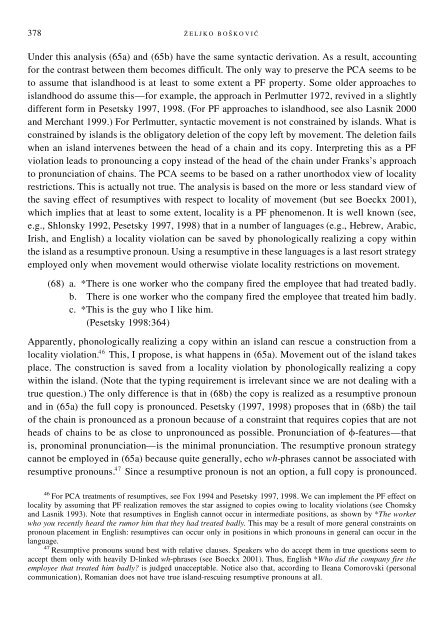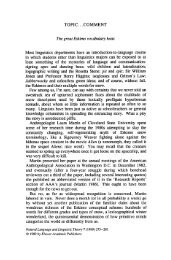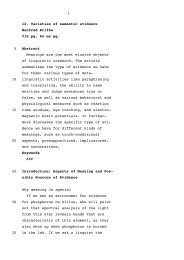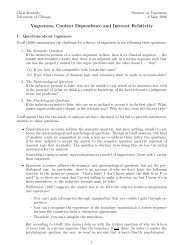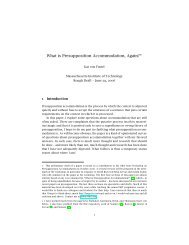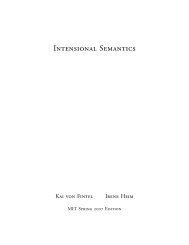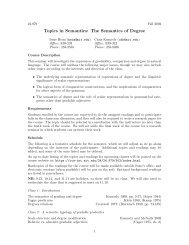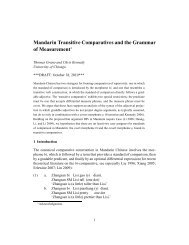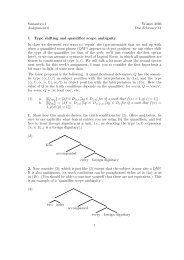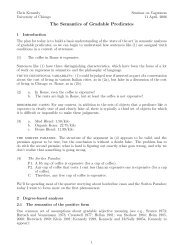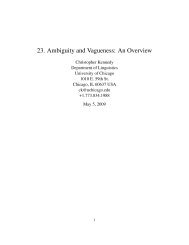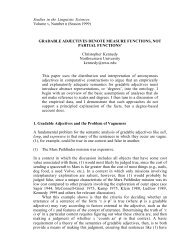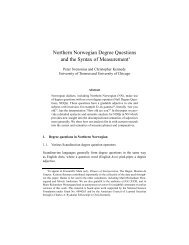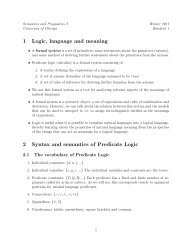On Multiple Wh-Fronting - University of Chicago
On Multiple Wh-Fronting - University of Chicago
On Multiple Wh-Fronting - University of Chicago
Create successful ePaper yourself
Turn your PDF publications into a flip-book with our unique Google optimized e-Paper software.
378 ZÏ E L J K O B O SÏ K O V I ĆUnder this analysis (65a) and (65b) have the same syntactic derivation. As a result, accountingfor the contrast between them becomes difficult. The only way to preserve the PCA seems to beto assume that islandhood is at least to some extent a PF property. Some older approaches toislandhood do assume this—for example, the approach in Perlmutter 1972, revived in a slightlydifferent form in Pesetsky 1997, 1998. (For PF approaches to islandhood, see also Lasnik 2000and Merchant 1999.) For Perlmutter, syntactic movement is not constrained by islands. <strong>Wh</strong>at isconstrained by islands is the obligatory deletion <strong>of</strong> the copy left by movement. The deletion failswhen an island intervenes between the head <strong>of</strong> a chain and its copy. Interpreting this as a PFviolation leads to pronouncing a copy instead <strong>of</strong> the head <strong>of</strong> the chain under Franks’s approachto pronunciation <strong>of</strong> chains. The PCA seems to be based on a rather unorthodox view <strong>of</strong> localityrestrictions. This is actually not true. The analysis is based on the more or less standard view <strong>of</strong>the saving effect <strong>of</strong> resumptives with respect to locality <strong>of</strong> movement (but see Boeckx 2001),which implies that at least to some extent, locality is a PF phenomenon. It is well known (see,e.g., Shlonsky 1992, Pesetsky 1997, 1998) that in a number <strong>of</strong> languages (e.g., Hebrew, Arabic,Irish, and English) a locality violation can be saved by phonologically realizing a copy withinthe island as a resumptive pronoun. Using a resumptive in these languages is a last resort strategyemployed only when movement would otherwise violate locality restrictions on movement.(68) a. *There is one worker who the company fired the employee that had treated badly.b. There is one worker who the company fired the employee that treated him badly.c. *This is the guy who I like him.(Pesetsky 1998:364)Apparently, phonologically realizing a copy within an island can rescue a construction from alocality violation. 4 6 This, I propose, is what happens in (65a). Movement out <strong>of</strong> the island takesplace. The construction is saved from a locality violation by phonologically realizing a copywithin the island. (Note that the typing requirement is irrelevant since we are not dealing with atrue question.) The only difference is that in (68b) the copy is realized as a resumptive pronounand in (65a) the full copy is pronounced. Pesetsky (1997, 1998) proposes that in (68b) the tail<strong>of</strong> the chain is pronounced as a pronoun because <strong>of</strong> a constraint that requires copies that are notheads <strong>of</strong> chains to be as close to unpronounced as possible. Pronunciation <strong>of</strong> f-features—thatis, pronominal pronunciation—is the minimal pronunciation. The resumptive pronoun strategycannot be employed in (65a) because quite generally, echo wh-phrases cannot be associated withresumptive pronouns. 4 7 Since a resumptive pronoun is not an option, a full copy is pronounced.46 For PCA treatments <strong>of</strong> resumptives, see Fox 1994 and Pesetsky 1997, 1998. We can implement the PF effect onlocality by assuming that PF realization removes the star assigned to copies owing to locality violations (see Chomskyand Lasnik 1993). Note that resumptives in English cannot occur in intermediate positions, as shown by *The workerwho you recently heard the rumor him that they had treated badly. This may be a result <strong>of</strong> more general constraints onpronoun placement in English: resumptives can occur only in positions in which pronouns in general can occur in thelanguage.47 Resumptive pronouns sound best with relative clauses. Speakers who do accept them in true questions seem toaccept them only with heavily D-linked wh-phrases (see Boeckx 2001). Thus, English *<strong>Wh</strong>o did the company fire theemployee that treated him badly? is judged unacceptable. Notice also that, according to Ileana Comorovski (personalcommunication), Romanian does not have true island-rescuing resumptive pronouns at all.


